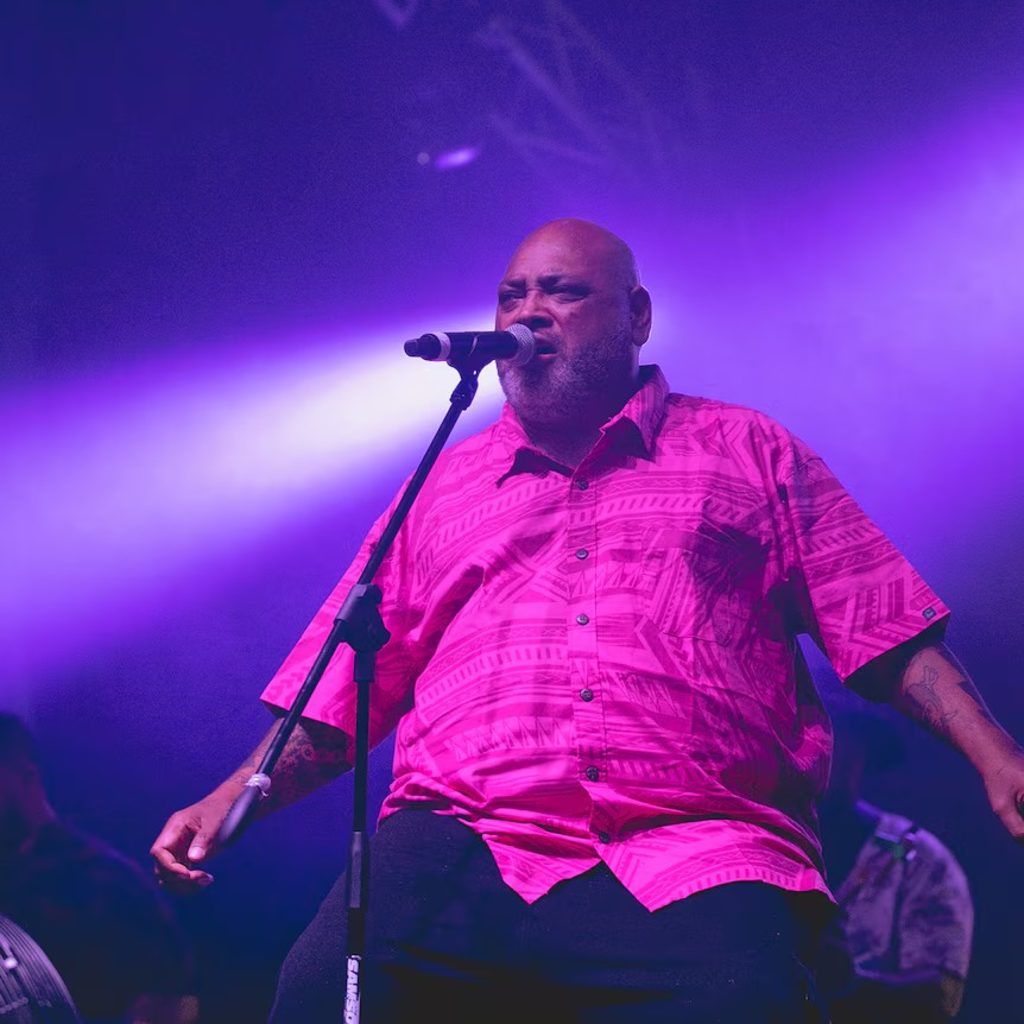HE wasn’t born into privilege. He didn’t speak from the high places of power or tradition. But George “Fiji” Veikoso spoke to the people — and for many, he was their voice.
Raised in the working-class neighbourhood of Raiwaqa, Suva, by a single mother, Fiji knew hardship early.
Fiji electrifies a crowd during his ‘Homecoming’ concert last year.
But in place of material comfort, he grew up wrapped in community, resilience, and the raw beauty of life as it is truly lived by so many iTaukei families.
That foundation gave his music something no fame could fabricate, truth.
He was no polished emissary of the chiefly order or cultural orthodoxy.
He did not represent the vanua in its ceremonial sense.
Instead, Fiji gave voice to those who felt estranged from it — physically, politically, spiritually.
He sang for the dislocated, the diaspora, and the ones trying to remember who they were from across the ocean.
In an emotional tribute shared via social media, Dr Ponipate Rokolekutu, Assistant Professor of Critical Pacific Islands and Oceania Studies at San Francisco State University, captured the essence of Fiji’s legacy.
“Fiji’s music didn’t name these wounds, it healed them,” he wrote.
“He didn’t sing about pain. He sang through it.”
Fiji’s sound — a fusion of reggae, R&B and island soul — was born of survival, then made sacred through story.
He sang in iTaukei, Maori, Samoan, and Tongan not to perform diversity, but to preserve lineage.
His rendition of the Maori waiata “E Papa Waiari” didn’t just entertain; it connected cultures across Moana Nui, stitching together a patchwork of pride and shared history.
He was, as many have called him, the godfather of island reggae.
A hitmaker. A bridge-builder. But perhaps most importantly, he was a reminder. A reminder of who we are when the world insists otherwise.
From Honolulu to Honiara, from Lautoka to Long Beach, from South Auckland to South Sacramento, his Pacific Island tour was more than a concert series.
It was a homecoming for those who never got to go home, Dr Rokolekutu wrote.
The Pacific diaspora felt this deeply.
One young iTaukei father in the United States described the loss of Fiji as “losing something that was always there… a sound that played in the background of everything, car rides, barbecues, rugby games, luaus, church, house cleaning.”
Fiji’s voice was the steady companion in foreign lands, especially for young Pacific Islanders navigating migration, marginalisation and identity.
As one fan put it: “Fiji’s music literally got me through dark days… Rest in Love, Fiji.
Thank you for sharing your gift. Ni gole ena vakacegu, Ratu George ‘Fiji’ Veikoso.”
More than a musician, Fiji was a lifeline.
His songs didn’t offer escape.
They offered restoration. They reminded the listener that even in a world of systemic erasure and misrepresentation, they belonged.
His music carried the ancestral ache of being neither fully.
American nor comfortably Indigenous, a duality many Pacific Islanders live every day.
And then there was that unforgettable moment, George “Fiji” Veikoso, the son of Raiwaqa, standing on American soil, singing the U.S. national anthem before a stadium crowd.
A voice not born of empire, but one that carried its colonial scars and sang anyway.
It was, as Rokolekutu described, not a performance, but “an act of survival.”
It echoed the words of Pacific Climate Warriors: “We are not drowning; we are fighting.”
In every lyric, every melody, Fiji gave his people something to hold onto.
In a world that too often sidelines, criminalises, and invisibilises Pacific voices, his music created memory.
Belonging.
A place to breathe
Even in his rise to global acclaim, Fiji never lost sight of his
roots.
He mentored young artists. He stayed grounded. He reminded us all that we don’t need to erase where we’re from to be seen or heard.
Now, his voice is silent, and the grief runs deep. But so does the gratitude.
He didn’t just sing songs.
He held a mirror to his people and said, “you are enough”.
Fiji’s music helped us love ourselves more loudly. For that, and for everything, we will never forget.



